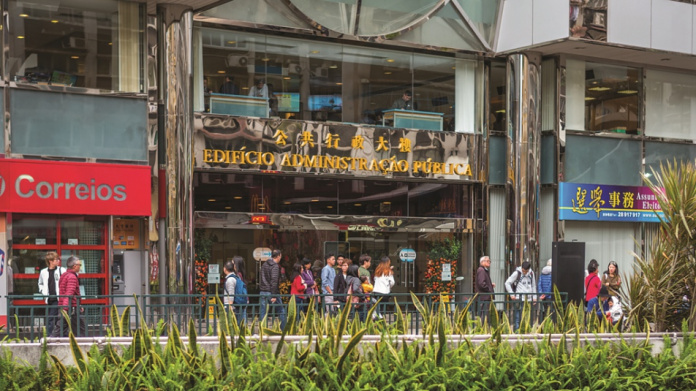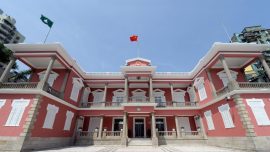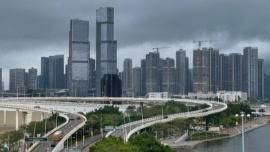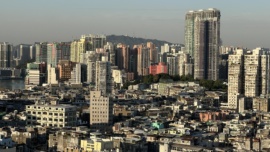
Macau Business | May 2022
Keith Morrison – Author and educationist
Across the world, a civil service job pays well and is secure. Not bad if you can get it, with competitive entry to it by hordes of applicants.
Latest figures show that Macau has 38,000 civil servants, just over 10 per cent of its employed population (like small Monaco); public administration and social security workers in Macau earn a median monthly salary of around 46,400 patacas. Singapore has 86,000 civil servants, some 2.4 per cent of its employed population, with an average monthly salary equivalent to just over 51,000 patacas. Hong Kong has nearly 177,000 civil servants, 4.6 per cent of the labour force, with a Master’s pay scale from HK$24,000 (10 points) to 135,470 HK$ per month (49 points), and a national average salary for a civil servant of HK$25,273 per month. Why does Macau have such a disproportionate number of civil servants and pay them so highly?
Proportionality and scalability are not exact or the same for small and large economies; small countries still need the full gamut of civil services. However, whilst it is very dangerous to generalize (not least as taxation varies dramatically across the world), it seems as though a job in the civil service/public service is pretty secure and pay is good. No wonder that, for many workers in Macau, it is like the author James Hilton’s Shangri-La; the lost horizon and perfect place of refuge from the vicissitudes of the outside world. Getting a job in the civil service is their dream, their sheltered world, their safe bubble.
Whilst workers in Macau struggle to keep their jobs in the private sector, civil servants in Macau continue to enjoy a blessed existence. No wonder they do anything to hang onto their jobs, e.g. don’t rock the boat, do as you are told, and don’t try to be creative; it’s dangerous to think or to have an idea. Be prepared to do a repetitive, dull job without questioning its worth. That’s almost to be expected in civil service jobs around the world. That’s bureaucracy for you.
The problem is that this mindset suffers from bureaucracy creep, failing to rectify inefficiency, and creating a workforce of compliant, docile functionaries, content to graze as long as there is grass. But it goes beyond that: to quote the social philosopher Habermas, bureaucracy ‘colonizes’ the ‘lifeworld’ of citizens, and, in doing so, stifles discussion, creative argumentation and thinking out of the box, reinforces existing power structures and furthers the Peter principle. Any discussion of the good life is deformed into ‘shut up, do your job, and take the money’.
How far does this apply to Macau? Here are eight light-hearted theorems of civil servants in Macau.

Theorem One: The number one task of the civil service in Macau is to give Macau people jobs in its civil service, regardless of needless bureaucracy and trouble that this creates for the public. It keeps the unemployment figures down.
Theorem Two: It doesn’t matter that Macau’s civil service is too big and flabby.
Theorem Three: The size of Macau’s civil service relates to the tasks that it sets for itself, not the tasks that really need to be done. Doing needless, really unnecessary tasks keeps people in jobs.
Theorem Four: The civil service is supposed to serve the public, but in Macau it is the other way round.
Theorem Five: One task of civil servants in Macau is to receive reports and documents on everything, from public and private enterprises, and then file them away, with no consequences, impact, and maybe even nobody ever reading them.
Theorem Six: Civil servants in Macau should have low expectations of themselves, and not worry about their ignorance of the field in which they are working.
Theorem Seven: The task of civil servants in Macau is to control beyond the legitimate boundaries of their role, and to encroach too far into the running of private enterprises.
For example, in the name of civil service, there is surveillance and intrusion into the lives and work of Macau’s citizens, employers and employees, the necessity or utility of which is opaque and incomprehensible. But never mind; it keeps the civil servants in a job. Even if you ask them why they need such-and-such a piece of information, or why they turn up at private enterprises to check out meaningless matters, the answer is something along the lines of a stony-faced ‘don’t ask, because I’ve been told to do it’, or, indeed, a smiling pretence that they haven’t even heard the question.
Theorem Eight: Getting value for money from the civil service doesn’t matter in Macau, as civil servants can more or less earn whatever they demand, by holding a relatively wealthy government to ransom.
If Macau’s endeavour is to be a smart city, then why are so many of its civil service practices and procedures so un-smart, unnecessary and monstrously bureaucratic, and its civil servants so overpaid, unthinking and unquestioning, however polite and smiling they are trained to be? Toy poodles in a dog show, obedient to their owners. Woof.
























